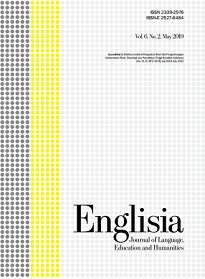TEACHER TEACHING STYLES IN INTRODUCING CONCEPT MAPPING STRATEGY IN READING COMPREHENSION ACTIVITY AT SENIOR HIGH SCHOOLS IN MEUREUDU, ACEH
DOI:
https://doi.org/10.22373/ej.v6i2.4548Keywords:
concept mapping, teaching style, reading comprehensionAbstract
The objective of this study is to learn how English teachers’ teaching style at Senior High Schools (SMAs) in Meureudu in introducing concept mapping strategy in delivering reading comprehension lesson. In teaching Reading Comprehension, different teaching styles gives different students learning experience and output, and using concept mapping, students are stimulated to have better control over their comprehension. This study was conducted at SMA 1 Meureudu and SMA 2 Meureudu, a town located 123 kms from Banda Aceh, Indonesia. Very often, English classes in schools located far from the main cities in Aceh suffer from lack interesting activity The study was using qualitative approach through class activity observations and interviews. Concept mapping activities facilitated by the teachers at SMA 1 Meureudu used digital projector and paper handouts as the media for the group activities. The teacher of SMA 2 Meureudu used only handout paper as a medium and by pairing the students. The findings of this study showed that the teaching styles in delivering reading activity using the concept mapping activity used by the teachers in both schools differ in the way how the teacher assign student to work on the task. The students were found to be more fully engaged in the reading activity with concept mapping compared to any past reading activities using translating line-by-line and answering questions. Assigning group reading task also help boost the students motivation and collaborative responsibility to learn.
Downloads
References
Bungin, B. (2007). Penelitian kualitatif: Komunikasi, ekonomi, kebijakan publik dan ilmu sosial lainnya. Jakarta: Putra Grafika
Charlton, B. C. (2005). Informal assessment strategies: Asking question, observing students, and planning lesson and promote successful interaction with Text, Portland: Pembroke.
Kalhor, M. (2016). The effect of concept mapping on EFL student meaningful learning English reading comprehension, Tehran, Iran: Counseling Center of Education office of Shahriyar.
Kaufman, J. (2008). 3 Simple techniques to optimize your reading comprehension and retention. Retrieved from https://joshkaufman.net/3-simple-techniques-to-optimize-your-reading-comprehension-and-retention/
Kinchin, I. M., Hay, D. B., & Adams, A. (2000). How a qualitative approach to concept map analysis can be used to aid learning by illustrating patterns of conceptual development. Educational Research, 42(1), 43-57.
Lincoln, Y. S. & Guba, E. G. (1985). Naturalistic inquiry. Newbury Park, CA: Sage Publications
Miles, M. B., Huberman, A. M. (1994). Qualitative data analysis: An expanded sourcebook. Thousand Oaks, CA: Sage.
Romli, M (2014). Improving students’ reading comprehension of narrative the text through story mapping: A classroom action research of the second grade of MTs Tarbiyatul Falah (Unpublished Undergraduate Thesis). Universitas Islam Negeri Syarif Hidayatullah Jakarta, Indonesia
Downloads
Published
Issue
Section
License
Proposed Policy for Journals That Offer Open Access
Authors who publish with Englisia journal agree to the following terms:
- Authors retain copyright and grant the journal right of first publication with the work simultaneously licensed under a Creative Commons Attribution License that allows others to share the work with an acknowledgement of the work's authorship and initial publication in this journal.
- Authors are able to enter into separate, additional contractual arrangements for the non-exclusive distribution of the journal's published version of the work (e.g., post it to an institutional repository or publish it in a book), with an acknowledgement of its initial publication in this journal.
- Authors are permitted and encouraged to post their work online (e.g., in institutional repositories or on their website) prior to and during the submission process, as it can lead to productive exchanges, as well as earlier and greater citation of published work (See The Effect of Open Access).









